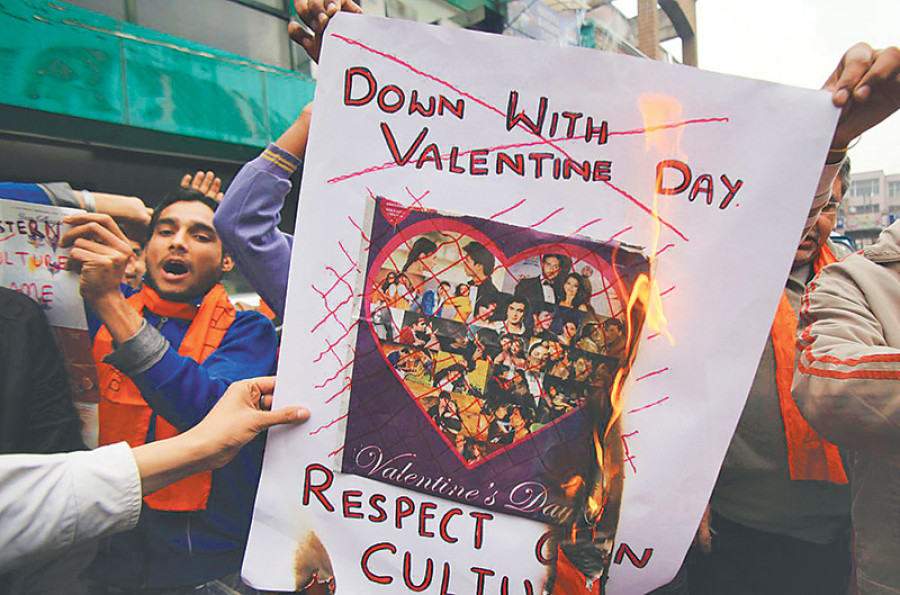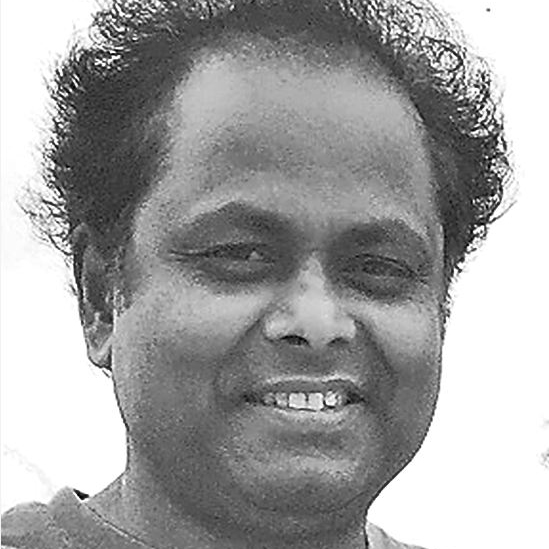Opinion
Zealous guys
Some Hindu groups see Valentine’s Day as an invasion of the west and a big threat
Pramod Mishra
Today, February 14, is Valentine’s Day, a day invented for love and romance by 14th-century poet Geoffrey Chaucer in his Parliament of Birds (1382). Chaucer wrote, “For this was on St Valentine’s Day, when every bird cometh there to choose his mate.” Before Chaucer, famous for The Canterbury Tales, mid-February was celebrated as a time of fertility in the Greco-Roman Lupercalia, associated with the city of Rome. Poets like Shakespeare and John Donne have also marked Valentine’s Day in their works as a day of love and romance, which is now celebrated in many Latin American countries as love and friendship or lovers’ day. But like many festivals, such as Thanksgiving and Christmas, St Valentine’s Day, too, has become an occasion for corporations to sell products. About 190 million Valentine’s Day cards are sent each year. This conjunction of love, a matter of the heart, and consumerism, whose source is profit or purse, is itself problematic to cultural critics. But despite all its commercialised hoopla, the day becomes an occasion for hearts and minds for longing and fulfilment of true or make-believe romance, whether within a formalised relationship or otherwise. Every year, the day arrives for ordinary mortals to do something in playful gesture to enliven an otherwise daily routine of modern
society.
Threat to some Hindus
But Valentine’s Day has become a big threat to some Hindu groups. They take it as an invasion of the west. They believe that as the West first colonised them, it has now come to corrupt their society. They first opposed it, threatening couples who roamed the parks and gardens. They warned shops that sold Valentine’s Day merchandise. But when youthful hormones proved more forceful than their orthodox diktats, the groups changed their tactics. They made the corrupting influence into something respectable. It was turned into Matri-Pitri Pujan (Mother-Father Worship) Day by a man who is himself in prison for life for sexually abusing young women. It is also marked as Black Day (to memorialise Bhagat Singh’s day of capital punishment by the British on this day), Lathi Puja or Stick Worship (to beat wayward couples with a stick), Wedding Day or even
Sister Day.
While Black Day invokes patriotism, Lathi Puja seeks to defend the honour of unmarried Hindu females from what they call Love Jihad, a phrase that means war against Hindus by seducing Hindu girls into marriage and converting them to Islam. And while Wedding Day threatens such amorous pairs with instant marriage wherever they are caught, Sister Day seeks to neutralise romantic feelings between a young man and a woman into sibling rivalry and purity.
One can get quite a misguided picture of Hindu society by looking at the deeds of these zealous campaigners of Hindu society. One shouldn’t forget that Basant Panchami, the worship of goddess Saraswati, heralds spring in South Asia leading, through Valentine’s Day, to Fagu Purnima or Holi in March. Fagu or Holi is not only a colour festival but also an occasion when, for a day, orthodox, puritanical protocols regarding food and drinks, language use and colour relax. The young throw colour, eat and drink intoxicant herbs and sing bawdy songs in the plains of India and Nepal. Krishna, the lover god, is said to initiate the romantic bawdy side of the festival whereas the myth of Prahlad symbolised the victory of good over demonic powers. In rural areas, Holi singers roam from house to house singing such amorous songs about Radha and Krishna and collecting donations.
But why are these orthodox, militant Hindu groups afraid of love among their young? One reason, as I mentioned above, is Hindu nationalism as a response to Islamic militancy. And I’m sure a Muslim mullah or militant Islamist in his society will have his own such explanation of the west’s corrupting influence. But is there another reason? Why force a young man and a woman into marriage on the spot during their solitary outing when they are caught together by these vigilantes?
With fear of Islam, there is fear of the family’s loosening grip on the young.
And that means fear of the breakdown of caste identity. These Hindu groups invoke Islam as their enemy and call upon the collective Hindu identity; but at heart, they are afraid of the breakdown of the caste system. And this fear is pervasive among those who consider themselves higher than others in the totem pole of hierarchy.
If we look into the history of the west, the bride’s virginity was a prized commodity even there for the groom if not for the bride. Fornication, an obsolete word by today’s standard in the West, was forbidden. This was a biblical injunction. Novels from the 18th and 19th centuries are filled with such examples where young men courted young women under the watchful eyes of their chaperones. Many born-again Christian families forbid sex before marriage even now. But society allows young men and women to get to know each other to see if they develop stable feelings for each other before they get bound by the ritual of marriage. And the social upheavals of the 1960s combined with medical progress in reproductive health,especially the pill, brought about the sexual revolution in the west.
Intellectual revolution
The question that we must ask is what sort of intellectual revolution will defeat the orthodox, the militant form of Hinduism? We saw communism making a slight dent socially in Nepal, Bengal and Kerala while failing to fully revolutionise the social structure. Will these societies be left to the forces of capitalism and democratic practice to bring about the gender revolution? Or, will there be some kind of European Enlightenment or the 1960s intellectual revolution that can transform society once and for all to bring it to face the challenges of the 21st century. It seems that the South Asian young, both male and female, but especially the female among the middle classes, have for too long been parent-reliant rather than self-reliant for life and career choices. Otherwise, these groups of zealots wouldn’t be as powerful and as influential as they have become in recent years.
Maybe Valentine’s Day can be a lesson that if one can exercise one’s agency in offering flowers or cards to the opposite sex of one’s liking, one can also make sound, considered decisions in other vital matters of life after due thought and consideration.
Mishra is the Department Chair of English Studies at Lewis University in the United States.




 11.5°C Kathmandu
11.5°C Kathmandu










